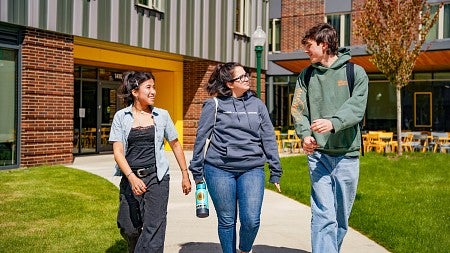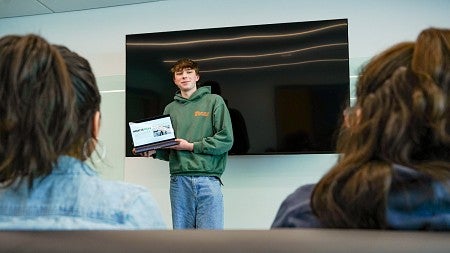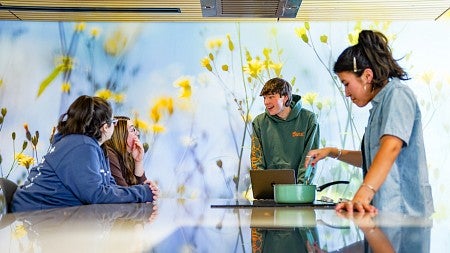Going away to college can be a challenging experience for many first-year students as they adjust to making new friends and living on their own for the first time.
To help ease that transition, University of Oregon Housing operates 14 academic residential communities (ARCs), where students who share a common interest live and learn in resident halls together. Each of the ARCs has a different identity, and students share a class or two each term with their small community.
“Living in an ARC can be a really valuable experience in your first year,” said Emily Henkelman, assistant director of student services and a career and academic advisor in the UO School of Journalism and Communication (SOJC). “It gives you a chance to have a built-in community as you are making that transition from high school. Having this group of people who are excited about the things you are excited about and who are willing to get in the classroom and learn with you about those things while also living down the hall from you is a really awesome opportunity for students.”
The SOJC’s Media and Social Action ARC, led by faculty director Derek Brandow, is designed for students who are interested in engaging with faculty and staff from the SOJC to develop skills in storytelling and media production. It’s open to all first-year students who have a passion for media and social action, not just those in the SOJC.
ARCs offer academic cohorts and support

Each term, students take a one- or two-credit seminar taught by the faculty director, where they hear from guest speakers from the SOJC and around the UO community, who offer feedback on their work from the ARC, teach students how to use tools such as Adobe Premiere Pro, engage in conversations around social media and help build community. This seminar also counts as a core social sciences academic requirement.
Media and Social Action ARC students are also guaranteed a seat in highly sought-after courses that satisfy additional academic requirements. One such class, Principles of Public Relations taught by Associate Professor Dean Mundy, director of the SOJC’s public relations undergrad major, gives students an overview of PR practices in a diverse global society, including theory, careers, history, communication forms and channels, law, and ethics.
Along with the seminars and courses, students work together on projects, ranging from making short films and creating podcasts to organizing events on campus. The projects change each term, but they all focus on social action or other areas of passion for the students.
Brandow said the projects do more than teach students about an issue.
“Students are learning how to be curious, learning how to ask for feedback, learning how to receive feedback and not be offended,” he said. “They’re learning how to ask questions and learning how to collaborate.”
Eliott Coda, a 2023-24 Media and Social Action ARC member, said his cohort produced three- to five-minute documentaries in winter term with the help of Oscar-nominated and Emmy-winning documentary filmmaker Professor Mitchell Block. In spring term, they collaborated with the UO Women's Center to bring awareness to sensitive subjects like sexual and domestic violence on campus for Sexual Assault Awareness Month.

Coda said the ARC eased his transition to college life.
“Coming to school as an out-of-state student, knowing that I would have a sense of social infrastructure built into my day-to-day life really eased my nerves going in,” Coda said. “The ARC has been a great way to build a sense of community and connection among some amazing people who I share so many incredible interests with.”
Julia Boring, a member of the ARC in 2022-23, said the experience helped her get out of her comfort zone.
“I had to reach out for help, ask for advice and learn from the people around me,” she said. “It felt really daunting at first, but facing that challenge and coming out successful was extremely rewarding.”
ARC students get extra support adjusting to college life
In addition to the seminars, classes and projects, students in the Media and Social Action ARC can also access college and career advice. Henkelman hosts designated advising office hours just for the ARC students and where she offers guidance on classes, helps with resume writing and advises them about scholarships and internships.
“Being part of any sort of residential community is a wonderful way to get connected to the University of Oregon and get connected to people who have a similar interest to you,” Henkelman said.
While the meetings and projects end after a student’s first year, the support from Henkelman, Brandow and other students continues until they graduate.
“There are three things that I see from students as they walk through a year-long experience in the ARC,” Brandow said. “One of them is a greater sense of belonging… and that the University of Oregon is their home, and this is a great place to be. Another thing is that people find relationships with their peers that are incredibly special and stand the test of time. The third thing that I love to see is this robust confidence that our ARC students have as learners and community members of the university.”

First-year students enrolling for the fall 2024 cohort must apply to join an ARC in their UO My Housing portal by May 15. To apply, register for housing and select an ARC or RC in the “Community Preference” dropdown under “Applications,” then fill out the community questions.
Brandow will interview those who apply to join the Media and Social Action ARC to determine if they are a good fit. Students will find out if they get into the ARC before housing opens in June.
Past ARC student Ainsley Maddalena said the experience was enriching.
“I see people across campus every day from the ARC who I am still connected with,” she said. “I have made lasting friendships with those in the ARC years above me and below.”
“Come ready to feel uncomfortable. Come ready to learn. Not every avenue will lead to success, and that's OK,” she said.
Boring echoed that sentiment.
“The people I met through the ARC are still some of my closest friends,” she said. “It was a highlight of my freshman year and helped me establish myself in a large school that can feel overwhelming at times.”
— By Sophie Fowler, class of ’26
Sophie Fowler, class of ’26, is an advertising major with a minor in multimedia. She is a member of the Clark Honors College and an intern with GoDucks Media and the SOJC Communication Office. You can connect with her on LinkedIn.
